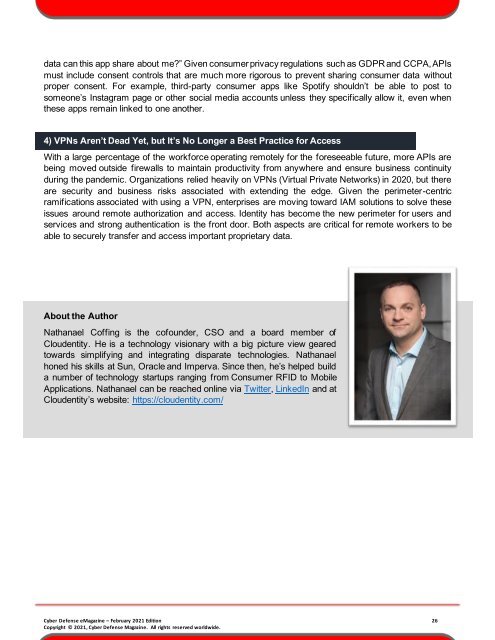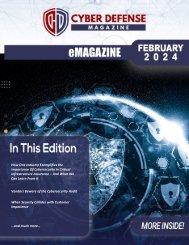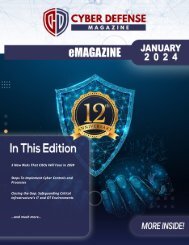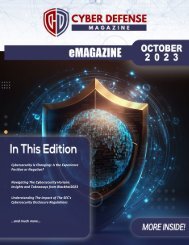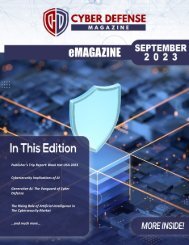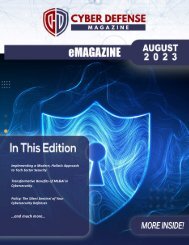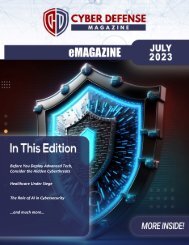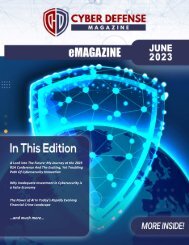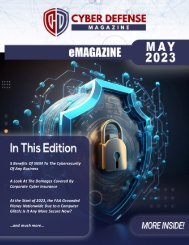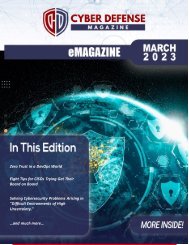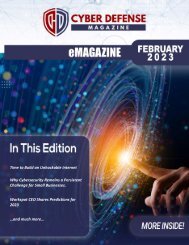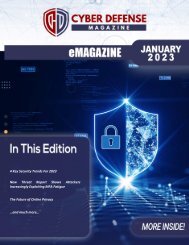Cyber Defense eMagazine February 2021 Edition
Cyber Defense eMagazine February Edition for 2021 #CDM #CYBERDEFENSEMAG @CyberDefenseMag by @Miliefsky a world-renowned cyber security expert and the Publisher of Cyber Defense Magazine as part of the Cyber Defense Media Group as well as Yan Ross, US Editor-in-Chief, Pieruligi Paganini, Co-founder & International Editor-in-Chief, Stevin Miliefsky, President and many more writers, partners and supporters who make this an awesome publication! Thank you all and to our readers! OSINT ROCKS! #CDM #CDMG #OSINT #CYBERSECURITY #INFOSEC #BEST #PRACTICES #TIPS #TECHNIQUES
Cyber Defense eMagazine February Edition for 2021 #CDM #CYBERDEFENSEMAG @CyberDefenseMag by @Miliefsky a world-renowned cyber security expert and the Publisher of Cyber Defense Magazine as part of the Cyber Defense Media Group as well as Yan Ross, US Editor-in-Chief, Pieruligi Paganini, Co-founder & International Editor-in-Chief, Stevin Miliefsky, President and many more writers, partners and supporters who make this an awesome publication! Thank you all and to our readers! OSINT ROCKS! #CDM #CDMG #OSINT #CYBERSECURITY #INFOSEC #BEST #PRACTICES #TIPS #TECHNIQUES
Create successful ePaper yourself
Turn your PDF publications into a flip-book with our unique Google optimized e-Paper software.
data can this app share about me?” Given consumer privacy regulations such as GDPR and CCPA, APIs<br />
must include consent controls that are much more rigorous to prevent sharing consumer data without<br />
proper consent. For example, third-party consumer apps like Spotify shouldn’t be able to post to<br />
someone’s Instagram page or other social media accounts unless they specifically allow it, even when<br />
these apps remain linked to one another.<br />
4) VPNs Aren’t Dead Yet, but It’s No Longer a Best Practice for Access<br />
With a large percentage of the workforce operating remotely for the foreseeable future, more APIs are<br />
being moved outside firewalls to maintain productivity from anywhere and ensure business continuity<br />
during the pandemic. Organizations relied heavily on VPNs (Virtual Private Networks) in 2020, but there<br />
are security and business risks associated with extending the edge. Given the perimeter-centric<br />
ramifications associated with using a VPN, enterprises are moving toward IAM solutions to solve these<br />
issues around remote authorization and access. Identity has become the new perimeter for users and<br />
services and strong authentication is the front door. Both aspects are critical for remote workers to be<br />
able to securely transfer and access important proprietary data.<br />
About the Author<br />
Nathanael Coffing is the cofounder, CSO and a board member of<br />
Cloudentity. He is a technology visionary with a big picture view geared<br />
towards simplifying and integrating disparate technologies. Nathanael<br />
honed his skills at Sun, Oracle and Imperva. Since then, he’s helped build<br />
a number of technology startups ranging from Consumer RFID to Mobile<br />
Applications. Nathanael can be reached online via Twitter, LinkedIn and at<br />
Cloudentity’s website: https://cloudentity.com/<br />
<strong>Cyber</strong> <strong>Defense</strong> <strong>eMagazine</strong> – <strong>February</strong> <strong>2021</strong> <strong>Edition</strong> 26<br />
Copyright © <strong>2021</strong>, <strong>Cyber</strong> <strong>Defense</strong> Magazine. All rights reserved worldwide.


